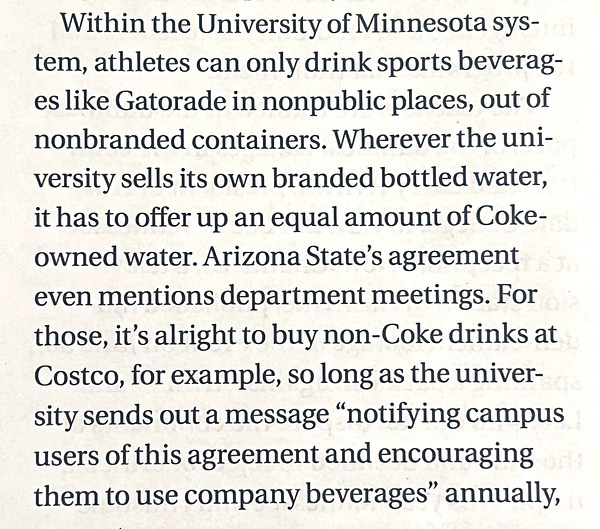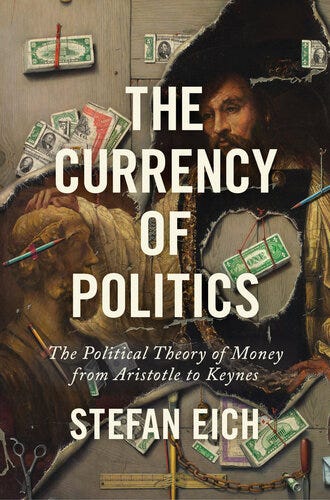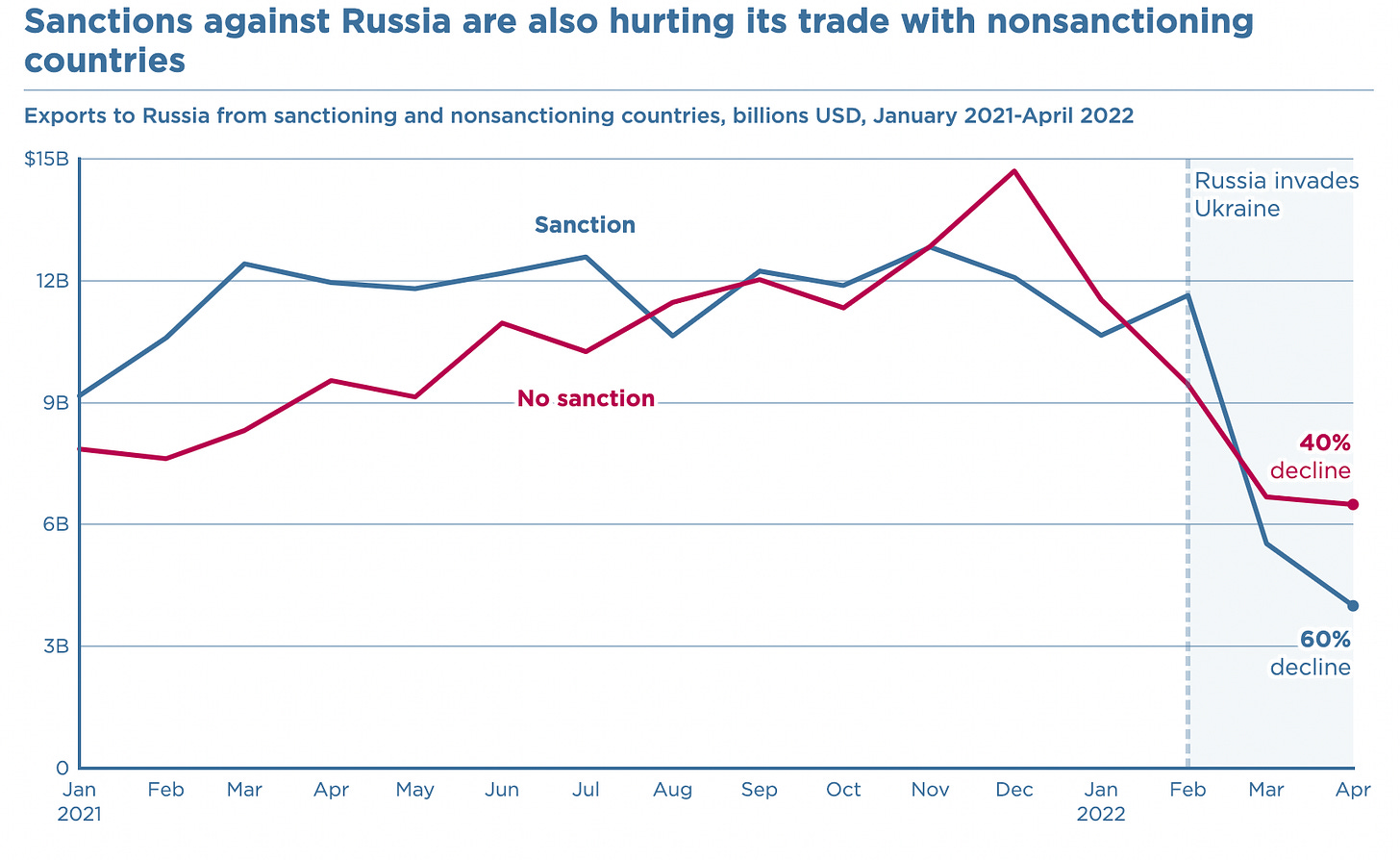Is Germany’s economic model busted … and who is Leonora Carrington?
Is Germany’s economic model busted?
Yanis Varufakis thinks so. Another powerful summary of his position:
Germans are now slowly coming to terms with the demise of their economic model and are beginning to see through the multifaceted Big Lie their elites were repeating for three decades: Fiscal surpluses were not prudence in action, but rather a monumental failure, during the long years of ultra-low interest rates, to invest in clean energy, critical infrastructure, and the two crucial technologies of the future: batteries and artificial intelligence. Germany’s dependence on Russian gas and Chinese demand was never sustainable in the long term; and they are not mere bugs that can be ironed out. …
Lacking a fiscal and a political union, the EU was always going to saddle Club Med governments, banks, and corporations with unpayable debts, which eventually would force the European Central Bank to choose between letting the euro die and embarking upon a permanent bankruptcy-concealment project.
Today the ECB is damned if it raises interest rates substantially (causing Italy and others to implode) and damned if it doesn’t (allowing runaway inflation). … Germans can see that their politicians lied to them that their economic model could survive the 2008 crisis as long as other eurozone countries practiced enough austerity. They are also coming to understand that their leaders’ stimulus-phobia led to permanent socialism for the southern European oligarchs, the Franco-German bankers, and various zombified corporations. …
My message to German friends is simple: Quit mourning. Cut through the denial, anger, bargaining, and depression, and start designing a new economic model. Unlike Greeks, you still have enough sovereignty to do so without the permission of creditors. But first, you must resolve a critical political dilemma: Do you want Germany to retain political and fiscal sovereignty? If so, your new model will never work within this eurozone of ours. If you do not want to go back to the Deutsche Mark, you need a model embedded within a full-fledged, democratic European federation. Anything else will continue the Big Lie with which you are now painfully coming to terms.
Yes, Social Media Really Is Undermining Democracy
Jonathan Haidt continues his crusade against the damage social media seems undoubtedly to be doing. It’s quite a lot worse than his last major effort however given how much the article is oriented around responding to bad faith interpretations of the research by none other than Mark Zuckerberg and Meta. Seems quite wrong to me that bad faith flacks seem to count as much in public debates as people who are at least trying to arrive at the truth.
A major feature of the post-Babel world is that the extremes are now far louder and more influential than before. They may also become more violent. Recent research by Morteza Dehghani and his colleagues at the University of Southern California shows that people are more willing to commit violence when they are immersed in a community they perceive to be morally homogeneous.
This finding seems to be borne out by a statement from the 18-year-old man who recently killed 10 Black Americans at a supermarket in Buffalo. In the Q&A portion of the manifesto attributed to him, he wrote:
Where did you get your current beliefs?
Mostly from the internet. There was little to no influence on my personal beliefs by people I met in person. ….
The loss of a common enemy and those other trends with roots in the 20th century can help explain America’s ever nastier cross-party relationships, but they can’t explain why so many college students and professors suddenly began to express more fear, and engage in more self-censorship, around 2015. These mostly left-leaning people weren’t worried about the “other side”; they were afraid of a small number of students who were further to the left, and who enthusiastically hunted for verbal transgressions and used social media to publicly shame offenders.
A few years later, that same fearful dynamic spread to newsrooms, companies, nonprofit organizations, and many other parts of society. The culture war had been running for two or three decades by then, but it changed in the mid-2010s when ordinary people with little to no public profile suddenly became the targets of social-media mobs. ….
I considered adding a short section to the article on what each of us can do as individuals, but it sounded a bit too preachy, so I cut it. I now regret that decision. I should have noted that all of us, as individuals, can be part of the solution by choosing to act with courage, moderation, and compassion.
A tweet reflecting my recent experience


Leonora Carrington: lost surrealist master
I’d never heard of this woman, but she’s quite a dame. Brooks no nonsense in discussion and her paintings are quite something! Make sure you watch the last three minutes of the video with some sumptuous surrealist art.
The Voice referendum process demands detail by its very nature, and it’s not ready
Guy Rundle on the referendum on the Voice, which is facing all the same dilemmas and divisions that scuttled the republic referendum.
The Voice is neither a simple principle nor a self-contained, clearly defined new institution; it asks the people to decide, then tells them to hand over all the crucial decisions to Parliament. At the heart of it is an entity that, it is claimed, is essential to close the gap, yet has no power. Best of all (that is, worst of all), it shifts the odds radically in favour of the “no” case. All they have to say is that it’s an ill-thought-out shemozzle. The “yes” case has to get an agreed-on version, and then sell it. …
The faith in the Voice seems to arise from the deep embeddedness of the leadership group in discourse, consultation and language, and draws on Anglo-American legal philosophy of right. In the conjuncture between leadership and consultation, a lot of people appear to have taken on a very similar way of talking, about a very specific sort of political object. In the process, it acquires a mystical glint, which gestures to notions of the pre-political.
Thus Roy Ah-See, very much part of the leadership push, told RN Breakfast that “[Voice critics] Lidia Thorpe represents a Green Voice and Jacinta Price a Blue Voice, but the Voice will represent a Black Voice!” How wonderful that Black opinion will be unitary and undivided, innocent of the divisions of actual politics — and presumably, of elected Black politicians, who, by this definition, are not Black at all. (Mr Ah-See’s services are available for life coaching.) …
In the stoush we’re about to have, the “no” side’s volunteers will have a 3×5 card saying “the Voice is a third chamber”. The “yes” side will have a manual in a ring binder. … In the political casino of the referendum, the House holds the advantage. You go in with the simplest plan to win, or you leave without your gold teeth.


The Currency of Politics. The Political Theory of Money from Aristotle to Keynes
A review of an interesting new book on the politics of monetary policy by Felix Martin, Author of Money: the unauthorised biography, which is an engaging and beautifully written history of money, and friend of mine. A good guy!
It was Keynes who formulated what became approximately the modern consensus for liberal, democratic states. In one of his characteristic coups of synthesis, Keynes’s mandarin economic liberalism found a way of accommodating both Fichte’s conviction that monetary policy should serve political ends and Locke’s preference for insulating it from democratic debate. The stage was set for technocratic central banks subject to the oversight of elected politicians.
Yet like so much of Keynes’s legacy, the question has always been how long it could outlast the great man’s gradually receding aura. As Eich writes, today’s “central banks — and the private banks they supervise — exist in a peculiar constitutional blind spot in our polities”. With the real value of national currencies evaporating and digital competitors multiplying merrily in the wings, it is hardly surprising that this blind spot is now coming under increasingly intense scrutiny.

Krugman on who’s embargoing whom
Western attempts to restrict Russian exports have been a bust. Russian oil is still finding its way to world markets, and if anything, the country appears to be flush with cash.
But while Russia is having no problem selling stuff, it’s having a lot of trouble buying stuff. Sanctions on Russia’s exports have, as I said, been a bust, but sanctions on its imports — refusal to sell Russia essential goods — have been more successful than, as far as I know, anyone expected. Even nations that aren’t part of the coalition imposing sanctions, including China, have sharply cut their exports to Russia.
Highly recommended lectures


Mark Textor on issues derivatives
An entire media and commentary class exists to tell us what voters and consumers are thinking. Or at least what they *guess* voters are thinking. Worse, they add a gratuitous level of political analysis to predict how people will then react to imagined changes in that thinking and in turn how voters may react. Confused? Imagine being an ordinary voter.
Fuelled by this practice of comment on comment, politics is now running at two speeds. In the fast lane getting air time are some online and TV panellists, desperately trying to plump up their billing hours contributing to the 24-hour commentary cycle. They make money by chewing up what are often quite simple issues and spitting out increasingly nuanced political analysis at an ever accelerating rate. The effect of all this is that we have a political equivalent of the financial derivatives market; only for issues.
From David Bentley Hart’s substack
Some of you may be readers of my eldest brother Addison H. Hart (to be distinguished from his son, Addison M. Hart), who lives in Norway principally because he married a little above his station. His wife is Solrunn Nes, one of the most distinguished iconographers in the world. After constant needling from one of his brothers, he and she have started a Substack newsletter devoted to Christian iconography. The articles are of course worth the price of the subscription; but the delightful truth is that the site will also feature samples of Solrunn Nes’s exquisite icons.
Cheerfulness
I enjoyed this LNL interview with the author of a new history of cheerfulness (and it’s commodification by modern capitalism). And also this piece from The Atlantic:
When it comes to moving votes and consuming public attention, the strongest and most negative emotions come to mind: anger, hatred, fear, resentment. But Timothy Hampton’s lively new cultural history of cheerfulness is a convincing argument that modest feelings matter too—even (or especially) as democracy shrivels and the planet overheats. Cheer, which Hampton describes as a “temporary lightness, a moderate uptick in mood,” turns out to have a captivating backstory; it’s helped people build communities, muddle through, and get ahead since at least the Middle Ages.
Hampton would like us to see cheerfulness as a rich moral sentiment, not just a fleeting psychological gimmick. Yet what he has really done, brilliantly if inadvertently, is reveal cheer’s shadow side: the way it lures us into valuing surfaces over substance, the peculiar degree to which it can be conjured and wielded at will, and, ultimately, how it so handily serves and protects those with power.
The Orient Express created in 1883
I could have shown you the tweet this was in. But then the picture wouldn’t have been quite so sumptuous.

























